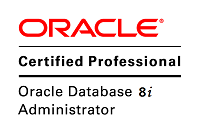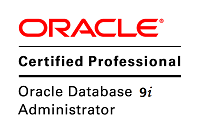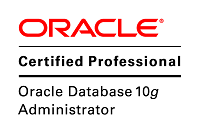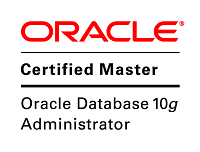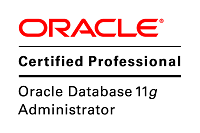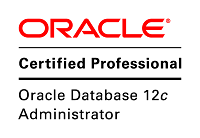联系:QQ(5163721)
标题:11.2单机数据库转换为RAC-2-手工方式(与9i,10g,11.1的方法一样)
作者:Lunar©版权所有[文章允许转载,但必须以链接方式注明源地址,否则追究法律责任.]
单机数据库转换为RAC,方法很多,前面的已经讲过使用rconfig的方法(11.2以后Oracle推荐的方法)。
但是我还是喜欢手工转换,感觉还是简单省事的,整个过程15分钟左右(主要是启动和关闭数据库的时间):
首先将单机数据库的pfile修改为RAC的pfile,具体如下:
*.audit_file_dest='/u01/app/oracle/admin/lunar/adump' *.audit_trail='NONE' *.compatible='11.2.0.3.0' *.control_files='+DATADG/lunar/control01.ctl','+DATADG/lunar/control02.ctl' *.db_block_size=8192 *.db_domain='' *.db_files=2000 *.db_name='lunar' lunar1.instance_number=1 lunar2.instance_number=2 *.db_recovery_file_dest='+RECODG' *.db_recovery_file_dest_size=536870912000 *.db_unique_name='lunar' *.deferred_segment_creation=FALSE *.diagnostic_dest='/u01/app/oracle' *.dispatchers='(PROTOCOL=TCP) (SERVICE=lunarXDB)' *.log_archive_dest_1='LOCATION=USE_DB_RECOVERY_FILE_DEST VALID_FOR=(ALL_LOGFILES,ALL_ROLES) DB_UNIQUE_NAME=lunar' *.log_archive_dest_state_1='ENABLE' *.open_cursors=200 *.pga_aggregate_target=7059552256 lunar1.local_listener=LISTENER_RAC1 lunar2.local_listener=LISTENER_RAC2 *.processes=2400 *.remote_login_passwordfile='EXCLUSIVE' *.resource_manager_plan='' *.session_cached_cursors=200 *.sga_target=0 *.standby_file_management='AUTO' lunar1.undo_tablespace='UNDOTBS1' lunar2.undo_tablespace='UNDOTBS2' *.undo_tablespace='UNDOTBS1' *.db_cache_size=3g *.shared_pool_size=3g *.streams_pool_size=128m lunar1.instance_name=lunar1 lunar2.instance_name=lunar2 *.java_pool_size=200m *.log_buffer=67108864 *.job_queue_processes=20 *.cluster_database=true *.cluster_database_instances=2 *.undo_management=AUTO *.db_create_file_dest='+DATADG' *.db_create_online_log_dest_1='+RECODG' lunar1.thread=1 lunar2.thread=2
然后使用这个pfile启动数据库:
08:26:59 @>startup pfile=/home/oracle/lunar/spfile.lunar.tmp ORACLE instance started. Total System Global Area 6881869824 bytes Fixed Size 2266064 bytes Variable Size 3573550128 bytes Database Buffers 3221225472 bytes Redo Buffers 84828160 bytes Database mounted. Database opened. 08:27:30 @>
然后添加thread 2的redo log group:
08:27:30 @>alter database add logfile thread 2
08:28:16 2 group 17 ('+RECODG') size 1024m,
08:28:16 3 group 18 ('+RECODG') size 1024m,
08:28:16 4 group 19 ('+RECODG') size 1024m,
group 20 ('+RECODG') size 1024m,
08:28:16 5 08:28:16 6 group 21 ('+RECODG') size 1024m,
08:28:16 7 group 22 ('+RECODG') size 1024m,
group 23 ('+RECODG') size 1024m,
08:28:16 8 08:28:16 9 group 24 ('+RECODG') size 1024m,
group 25 ('+RECODG') size 1024m,
08:28:16 10 08:28:16 11 group 26 ('+RECODG') size 1024m,
08:28:16 12 group 27 ('+RECODG') size 1024m,
group 28 ('+RECODG') size 1024m,
08:28:16 13 08:28:16 14 group 29 ('+RECODG') size 1024m,
08:28:16 15 group 30 ('+RECODG') size 1024m,
08:28:16 16 group 31 ('+RECODG') size 1024m,
08:28:16 17 group 32 ('+RECODG') size 1024m
;08:28:16 18
Database altered.
Elapsed: 00:00:28.51
08:28:46 @>
创建thread 2使用的UNDO TABLESPACE:
08:28:46 @>CREATE UNDO TABLESPACE UNDOTBS2 DATAFILE '+DATADG' SIZE 10480m ; Tablespace created. Elapsed: 00:00:09.87 08:29:11 @>
然后enable这个thread 2:
08:29:11 @>alter database enable public thread 2; Database altered. Elapsed: 00:00:00.59 08:29:29 @>
最后,执行创建RAC的一些必要试图的脚本:
@?/rdbms/admin/catclust.sql
有些人说这个可以不执行,也有很多GV$的视图,但是实际上这个脚本是必须执行的,否则会缺少一部分GI需要视图
比如V$BH等等,具体可以查看catclust.sql脚本
都做完以后,就可以启动数据库了:
[oracle@dm01db02 ~]$ ss
SQL*Plus: Release 11.2.0.4.0 Production on Sun May 3 08:47:51 2015
Copyright (c) 1982, 2013, Oracle. All rights reserved.
Connected to an idle instance.
SYS@lunar2>startup
ORACLE instance started.
Total System Global Area 6881869824 bytes
Fixed Size 2266064 bytes
Variable Size 3573550128 bytes
Database Buffers 3221225472 bytes
Redo Buffers 84828160 bytes
Database mounted.
Database opened.
SYS@lunar2>select * from v$active_instances;
INST_NUMBER INST_NAME
---------------- ------------------------------------------------------------------------------------------------------------------------
1 lunar1.lunar.com:lunar1
2 lunar2.lunar.com:lunar2
Elapsed: 00:00:00.00
SYS@lunar2>
这里看到已经是RAC数据库了,RAC中最好使用spfile文件,因此我们也创建spfile,例如:
SYS@lunar2>show parameter spfile
NAME TYPE VALUE
------------------------------------ ----------- ------------------------------
spfile string +DATADG/lunar/parameterfile/spf
ile.3296.878718931
SYS@lunar2>
然后把这数据库加入到CRS,就可以由CRS来管理了:
[oracle@dm01db01 ~]$ srvctl add database -d lunar -o /u01/app/oracle/product/11.2.0.4/dbhome_1 [oracle@dm01db01 ~]$ srvctl add instance -d lunar -n dm01db01 -i lunar1 [oracle@dm01db01 ~]$ srvctl add instance -d lunar -n dm01db02 -i lunar2 [oracle@dm01db01 ~]$ srvctl modify database -d lunar -n lunar [oracle@dm01db01 ~]$ srvctl config database -d lunar Database unique name: lunar Database name: lunar Oracle home: /u01/app/oracle/product/11.2.0.4/dbhome_1 Oracle user: oracle Spfile: +DATADG/lunar/parameterfile/spfile.3296.878718931 Domain: Start options: open Stop options: immediate Database role: PRIMARY Management policy: AUTOMATIC Server pools: lunar Database instances: lunar1,lunar2 Disk Groups: DATADG,RECODG Mount point paths: Services: Type: RAC Database is administrator managed [oracle@dm01db01 ~]$

